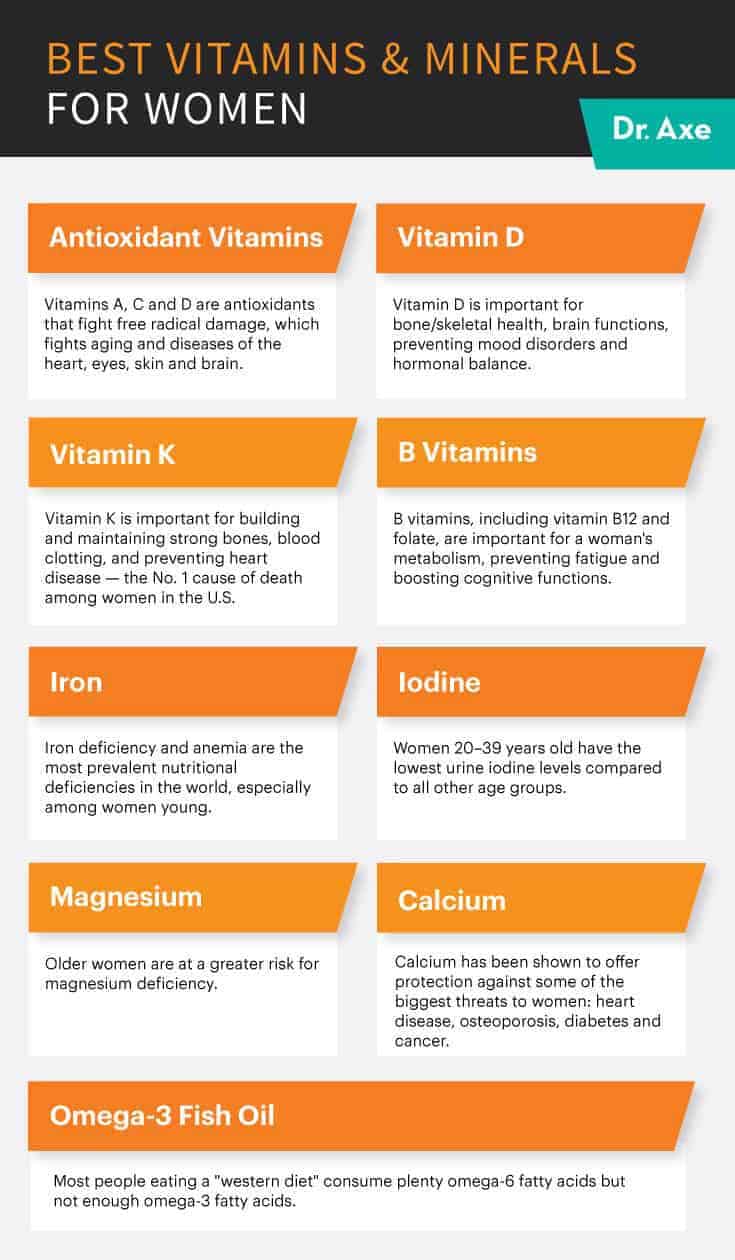
While it’s possible to get all of the vitamins and minerals you need from careful food selection and a nutrient-dense diet, research shows many women still experience at least one type of nutrient deficiency, if not more.
What vitamins should a woman take on a daily basis? There are 13 vitamins all women need — all which are among the best vitamins for women to take — including vitamins C, A, D, E, K and the B vitamins (such as thiamine and vitamin B12), plus a number of important trace minerals, too.
It’s believed that around 30 percent of all women are deficient in one or more of these vitamins and minerals, and for many women the risk only increases with age. Another scary finding? Estimates show about 75 percent of women would likely develop nutrient deficiencies if supplemental multivitamins didn’t exist.
With that in mind, what are the most important and best vitamins for women in order to prevent deficiencies and the complications that come with them? The following are the absolute best vitamins for women.
Best Vitamins for Women
Whether you’re in your 20s, 30s, 40s, 50s, 60s, 70s or older, here are the best vitamins for women that you should make sure to get enough of. Take note of the recommended daily amounts, as many quality multivitamins for women will include at least that amount. In other cases, you may to specifically supplement with that vitamin or at least make sure to eat a lot of foods rich in that vitamin.
1. Vitamins A
Antioxidant vitamins A, C and E fight free radical damage, which is the underlying cause of aging and many diseases that affect the heart, eyes, skin and brain. For example, vitamin A works to protect healthy cells and halt cell mutations.
What is a fat-soluble vitamin? Vitamin A and other fat-soluble vitamins D, E and K have the ability to travel through fat and be stored inside body fat or organs, including the liver.
Vitamin A plays a critical role in maintaining healthy eyes and vision, neurological function, healthy skin and hormonal/reproductive health, and it supports the lungs, liver, kidneys and digestive organs.
The Recommended Daily Allowance (RDA) for vitamin A is 700 micrograms a day for adult women. Recommended intake of vitamin A for women who are pregnant or nursing ranges between 1,200 and 1,300 micrograms per day, since developing fetuses need vitamin A for proper growth.
2. B Vitamins, Including Folate
B vitamins, including vitamin B12 and folate, are important for a woman’s metabolism, preventing fatigue and boosting cognitive functions. They help with many cellular processes, growth and energy expenditure because they work with other vitamins like iron to make red blood cells and help turn the calories you eat into useable “fuel.”
Folate (which is called folic acid when it’s created synthetically) is critical for a healthy pregnancy, developing fetuses and preventing birth defects since it helps build the baby’s brain and spinal cord. That’s why folate deficiency is extremely dangerous for pregnant women.
You can get plenty of B vitamins from animal products like cage-free eggs, fish, meat, milk and yogurt. Older women, those with anemia, vegans and vegetarians should work with a doctor to make sure they get enough B vitamins since they’re at the greatest risk for deficiency. Foods especially high in folate include spinach and leafy greens, asparagus, citrus fruits, melon and beans.
When taking a supplement containing folate, be wary of synthetic folic acid. Instead, stick to fermented folic acid, which is metabolized by the body similarly to naturally occurring folate. High-quality multivitamins for women will often feature large amounts of B vitamins, particularly vitamin B12.
How much vitamin B do you need to prevent vitamin B deficiency? Here’s what the the Institute of Medicine recommends for daily intake of B vitamins among adults:
- Vitamin B1: 1.1 to 1.2 milligrams per day.
- Vitamin B2: 1.1 to 1.3 milligrams per day.
- Vitamin B3: 14 to 16 milligrams per day.
- Vitamin B5: 5 milligrams per day.
- Vitamin B6 (may be called pyridoxine): 1.3 to 1.7 milligrams per day.
- Vitamin B7: 30 micrograms per day.
- Vitamin B12 (may be called cobalamin): 2.4 micrograms per day.
- Folate: 400 micrograms per day.
3. Vitamin C
Vitamin C, also known as ascorbic acid, is a water-soluble vitamin that is found in many types of fruits and vegetables. It acts as an antioxidant to neutralize free radicals and reduce the risk of inflammation and disease.
A water-soluble vitamin is not stored in the body and must be consumed each day. B vitamins join vitamin C as the only water soluble vitamins.
Vitamin C not only improves immunity against colds, infections and other illnesses. Your body also uses vitamin C to synthesize important compounds like collagen, a type of structural protein that makes up connective tissue and aids in wound healing. As a result, vitamin C is also believed to help slow down skin aging and can also protect against skin damage and free radical formation caused by ultraviolet exposure.
For women at least 19 years old, 75 milligrams daily is recommended. Individuals who smoke need an additional 35 milligrams of vitamin C daily. For women who are pregnant and breastfeeding, daily amount should be between 85 and 120 milligrams.
4. Vitamin D3
Vitamin D3 is one of the most buzzed-about supplements in the health industry. It’s estimated that over 40 percent of the population is deficient in vitamin D, which plays a central role in everything from regulating mood to modulating immune cells in the body and beyond.
Vitamin D3 can be obtained from certain foods like eggs, some dairy products and certain mushrooms, but we get the overwhelming majority of our vitamin D from sun exposure.
Vitamin D3 is important for bone/skeletal health, brain functions, preventing mood disorders and hormonal balance, since it acts very similarly to a hormone once inside the body. Your best bet to make sure you get enough is to spend 15–20 minutes outside most days of the week without sunscreen on, which allows vitamin D3 to be synthesized when it comes into contact with your skin.
The RDA for vitamin D is 600 IU for women and 800 IU for adults over 70 years. However, many believe that the recommended vitamin D3 dosage should be even higher, and supplements often contain doses of up to 5,000 IU per day. Check with your healthcare provider to find the right amount for you.
READ RELATED: At least 5,000 Covid patients in England are NOT primarily in hospital for virus: analysis
5. Vitamin E
Positive effects of vitamin E include its ability to support proper functions of many organs, enzymatic activities and neurological processes. For example, consuming enough of this antioxidant vitamin, ideally from vitamin E-rich foods but also supplements, can include helping reduce the risk of prostate cancer, coronary heart disease and mild cognitive impairment.
Additionally, it can help in balancing cholesterol, repairing damaged skin, thickening hair, balancing hormones, helping PMS symptoms and improving vision.
Getting enough vitamin E seems to be especially critical for the very young (fetuses or infants), the elderly, and women who are or may become pregnant.
The RDA for vitamin E is 15 milligrams (22.4 IU) per day for women 14 years and over, including those who are pregnant. Breastfeeding? Then up the amount to 19 milligrams (28.5 IU) per day.
6. Vitamin K
Vitamin K is important for building and maintaining strong bones, blood clotting, and preventing heart disease — currently the No. 1 cause of death among women living in the U.S. and many other western nations. Many women fall short in this valuable nutrient, which is a shame considering studies have shown that individuals who increase their intake of dietary vitamin K have a lower risk of cardiovascular mortality.
You’re most likely to be low in vitamin K if you’ve been taking antibiotics for an extended period of time, suffer from intestinal problems such as IBS or inflammatory bowel disease, or you take cholesterol-lowering medications. There are two main types of vitamin K, both of which we acquire from our diets. Vitamin K1 is found in vegetables, while vitamin K2 is found in things like dairy products. The best way to prevent vitamin K deficiency is to eat plenty of different veggies, including green leafy vegetables, broccoli, cabbage, fish and eggs.
The Food and Nutrition Board at the Institute of Medicine recommends the following as adequate intakes of vitamin K:
- Females age 14 – 18: 75 mcg/day
- Females age 19 and older: 90 mcg/day

Best Minerals
While technically the nutrients below aren’t “vitamins” (they’re actually essential minerals and fatty acids), it’s important for women to prevent deficiencies in these, too. Most of these can be found in many multivitamins for women.
1. Iron
Iron deficiency and anemia are the most prevalent nutritional deficiencies in the world, especially among women young. The body uses iron to produce hemoglobin, a type of protein that transports oxygen via blood from the lungs to other tissues throughout the body. There are two different kinds of iron (heme and non-heme), and the most absorbable and easily utilized by the body is the kind found in animal proteins like eggs, meat, fish and poultry (leafy greens and beans are good plant-based options, too).
Adolescent girls are at the highest risk for iron deficiencies, and women in general need to be careful to get enough since demand for iron increases during menstruation due to blood loss. It’s been found that, globally, about 50 percent of all pregnant women are very low in iron to the point of being considered anemic. Women with adequate stores of iron and vitamin B12 and are less likely to suffer from fatigue, poor immunity and fatal infections, dangerous pregnancies, and bleeding episodes that put their lives at risk.
Women require a higher amount of iron each day due to blood loss caused by menstruation. Women over age 19 need about 18 milligrams of iron daily, or around 27 milligrams daily during pregnancy. These needs decrease to around 8 milligrams daily after age 51.
2. Iodine
According to the Centers for Disease Control and Prevention, women between the ages of 20–39 have the lowest urine iodine levels compared to all other age groups. Iodine intake is especially important for young women looking to become pregnant or who are pregnant because it plays a role in brain development of the growing fetus. It’s also crucial for making proper amounts of thyroid hormones.
Most people eating a western diet consume a good deal of iodized salt found in packaged foods and refined grain products, which has iodine added purposefully to help prevent deficiencies. But an even better way to get the iodine you need is from iodine-rich foods like sea veggies and seafood, the major natural dietary sources of this nutrient. Avoiding an iodine deficiency helps protect you from conditions like hypothyroidism, goiters, fatigue, hormonal imbalances and trouble during pregnancy.
The RDA for iodine is 150 micrograms every day for those over the age of 14. For those pregnant or breastfeeding, the amount goes up to 290 micrograms every day.
3. Magnesium
Magnesium is one of the most important minerals in the body but also one of the most common deficiencies. As an electrolyte, magnesium helps regulate calcium, potassium and sodium and is essential for over 300 different biochemical functions in the body. On a global scale, soil depletion has resulted in many crops being lower in magnesium than in past generations — plus health conditions like digestive disorders, leaky gut, chronic stress and ongoing medication use can all lower someone’s magnesium levels.
Leg cramps, insomnia, muscle spasms, anxiety, headaches and digestive issues like constipation can all be signs of magnesium deficiency. For older women, the risk of deficiency might be even greater. Studies have shown that many older people don’t eat magnesium-rich foods — such as leafy green veggies, sea vegetables/algae, beans, nuts and seeds — to begin with, plus they’re prone to experiencing reduced magnesium intestinal absorption, reduced magnesium bone stores and excess urinary loss.
In general, aim for around 320 milligrams per day for most adult women.
4. Calcium
Getting enough calcium is important for bone strength, but it’s also crucial for regulating heart rhythms, aiding in muscle functions, controlling blood pressure and cholesterol levels, and many other functions related to nerve signaling too.
Calcium, when consumed when other key nutrients like vitamin D and magnesium, has been shown to offer protection against some of the biggest threats to women: heart disease, osteoporosis, diabetes and cancer, for example. Calcium deficiency is very common among both men and women, however.
Calcium is not absorbed properly when someone has low levels of vitamin D and magnesium (deficiencies in both are common), plus certain crops that are normally high in calcium have become depleted of minerals due to soil depletion. This electrolyte, which is actually the body’s most abundant mineral, can be obtained from drinking raw milk, having yogurt or kefir, and from certain plant foods (especially organic types) like leafy green vegetables (such as collard greens and kale), broccoli, okra and beans.
Supplementing with calcium has pros and cons, so speak with your doctor about your risk factors, and first try to get enough from foods if you can. Calcium is found in most multivitamins, and ideally you end up with about 1,000 milligrams per day for adult women.
Final Thoughts
- It’s believed that around 30 percent of all women are deficient in one or more of the most important vitamins and minerals, and for many women the risk only increases with age. Another scary finding? Estimates show about 75 percent of women would likely develop nutrient deficiencies if supplemental multivitamins didn’t exist.
- The best vitamins for women include vitamins A, C, D, E, K and B vitamins. In addition to the best vitamins for women, other nutrients that are important include iron, iodine, magnesium and calcium.
- Risk factors that make a women more likely to have a vitamin or mineral deficiency include: eating a highly processed diet, being vegetarian or vegan, being underweight or consuming too little calories in general, being of reproductive age, being over the age of 65, and having a low socioeconomic status, a lack of education and living in poverty.
- Make sure to consume as many of the best vitamins for women as possible in order to be the healthiest you can be and prevent nutritional deficiencies.
- If you’re looking for a high-quality multivitamin, I highly recommend choosing a fermented option, as this form of predigestion makes the nutrients a vitamin contains more absorbable for your digestive system. You may also try multivitamins that are packed with additional superfood ingredients like spirulina, camu camu, chia seeds, apple cider vinegar and ashwagandha.
Source:







